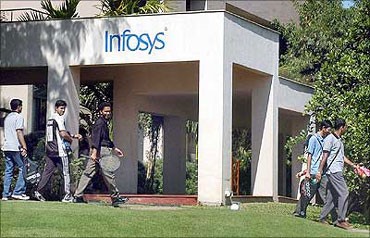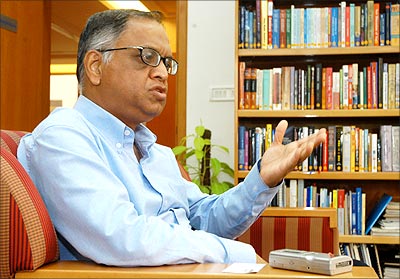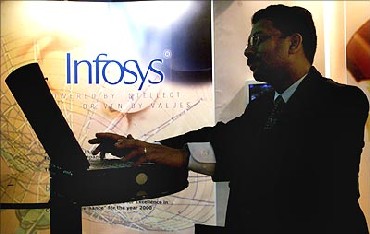 | « Back to article | Print this article |
Infosys has given stock options worth Rs 50,000 crore till now
Since its inception in July 1981 with a capital of Rs 10,000 that the current chairman, N R Narayana Murthy, borrowed from his wife, Infosys has given stock options worth Rs 50,000 crore (Rs 500 billion) to employees.
The shares given to employees since Infosys was a private entity have cumulatively earned this amount, including the bonus, according to the company's annual report for 2010-11.
"I do not know of any Indian company that has given as much as Rs 50,000 crore (at current stock prices) of stock options to employees. Today, every Indian employee at every level who joined us on or before March 2010 is a stock holder of Infosys," Murthy has written in an article in the company's annual report for 2010-11.
Click NEXT to read on . . .
Infosys has given stock options worth Rs 50,000 crore
Murthy, who will retire in August this year, says this in the context to what leaders in companies should do with examples from Infosys.
When the company was in infancy, all seven co-founders were given 10-15 per cent equity. Even when Infosys was still private, the company started giving stock options to some employees, and the co-founders had to dilute their holdings.
So much so that by March 31, 1992, the employees (other than the co-founders) owned 13.6 per cent of the total shares.
Thereafter, the company went for an initial public offer in February 1993 to build a campus for 1,000 people at a cost of Rs 16.58 crore (Rs 165.8 million). This was nearly double the Rs 8.66 crore (Rs 86.6 million) revenue the company clocked the previous year.
Click NEXT to read on . . .
Infosys has given stock options worth Rs 50,000 crore
In 1994, Infosys introduced the stock option scheme, which along with the 1998 ADR (American depository receipt) scheme and the 1999 scheme gave shares to over 18,000 employees.
In July 1994, Infosys went for private placement of shares with foreign institutional investors to raise Rs 25 crore (Rs 250 million), which resulted in further dilution of stakes of co-founders.
Over the years, it was not just software professionals who benefited but also drivers, office assistants and secretaries.
Click NEXT to read on . . .
Infosys has given stock options worth Rs 50,000 crore
Even public shareholders have grown their wealth many times since the company's IPO days. For example, 100 shares issued in the IPO at Rs 9,500 have become 12,800 shares valued at Rs 4.15 crore (Rs 41.5 million) -- as on March 31, 2011.
This is an annual compounded growth rate of 59 per cent, with a total gain of 464,422 per cent.
Even though the company stopped giving employee stock options about four years ago on completion of its 30th year of operations, eligible employees were given stock options last year through the employees welfare trust.




